60 percent conservation and digitisation complete
Over 60 percent of conserving rare and priceless palm leaf scripts and paper manuscripts of many centuries stored at Oriental Research Institute (ORI), governed by the University of Mysore (UoM), has been completed along with digitisation of over 3,000 manuscripts.
ORI houses over 70,000 manuscripts that date back over 700 years, written in languages such as Sanskrit, Kannada, Tamil and Telugu. In addition, the institute preserves 41,000 rare printed and other types of manuscripts, containing literary works and treatises on various subjects.
These manuscripts cover a wide range of subjects such as philosophy, religion, literature, linguistics, astrology, medicine, and various branches of knowledge. To further enhance the preservation and accessibility of these valuable manuscripts, UoM entered into a Memorandum of Understanding (MoU) with Bengaluru’s Mythic Society in 2022 for their digitisation.
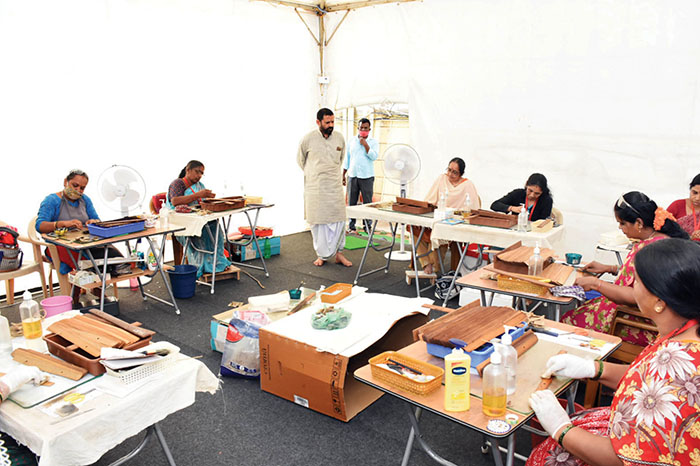
Accessible to all
Under the project, the ORI palm leaf manuscripts are undergoing a thorough cleaning process, establishing regular procedures for their preservation. The titles encompassing palm leaf manuscripts, handwritten works and collections of printed works will be catalogued and made accessible to the public.
Moreover, all the palm leaf works and books will be carefully image-scanned and securely stored, while the digitised images will be subjected to crowd-sourced text digitisation. The 112-year-old Mythic Society, a venerable institution with over decades of experience in the conservation and digitisation of palm leaf and paper manuscripts, is bringing its expertise to this collaborative effort.
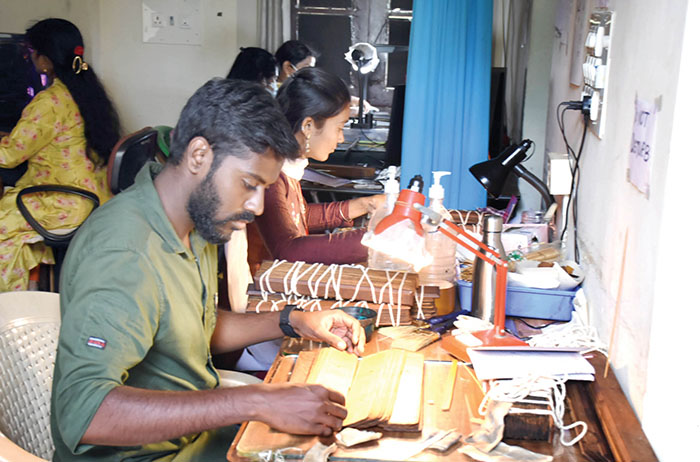
Job by 34 professionals
A team of 34 professionals, fully trained in conserving the manuscripts, is doing the job at ORI. One of the most important conservation measures is fumigation. For fumigation, the manuscripts will be placed inside the Fumigation Chamber to make them free from dust and termites. The ORI has a dedicated fumigation chamber, which is used to save manuscripts that are showing signs of insect damage.
Later, lemongrass (Cymbopogon citratus) oil is applied to the fumigated manuscripts and dried for some time. Lemongrass oil has a mild citrus flavour with a sweetish taste. It does not contain any residues and due to its smell, moths and insects stay away. The oil also smoothens the manuscripts to ensure longevity.
Manuscripts that are in poor condition are rebound. This involves removing the manuscripts from their old bindings and placing them in new red cotton cloth bindings that are made from acid-free and starch-free materials. Also, manuscripts damaged by insects, mold or other factors are repaired and this process involves mending tears, removing stains or filling in missing pieces of text.
Preservation measures involve maintaining temperature and humidity-controlled environments to prevent deterioration, as well as protecting the manuscripts from pests and other potential threats.
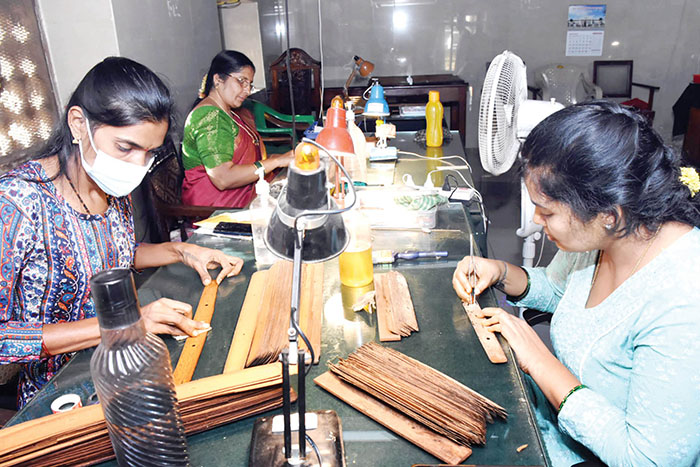
Image-scanned and transmitted
The manuscripts are image-scanned with a CZUR scanner and a photocopy machine is not used. Rare manuscripts have to be digitised and even improved for readability with 300 DPI (dots per inch) quality. Teams are undertaking the digitisation process with each page of the book being scanned through a Czur scanner.
Czur scanner captures bound, rare, historical, out of prints and fragile manuscripts. They are carefully scanned and the images captured. They are scanned either in colour, black and white or grayscale as necessary. The scanned copies are then converted to formats including PDF, jpeg and PNG and uploaded on the website.
Digitisation plays a significant role in making these manuscripts accessible to a wider audience. By creating digital copies of the manuscripts, ORI ensures their availability for scholarly research, academic purposes and public viewing. This process not only safeguards originals but also facilitates easier sharing and dissemination of knowledge. The project is estimated to cost Rs. 1 crore.
It is worth noting that ORI holds the unique and fully intact volume of Kautilya’s Arthashastra, which provides valuable insights into the political system and statecraft of ancient India. This significant discovery was made at ORI in 1905 by scholar Rudrapatna Shamasastry, who subsequently published it.
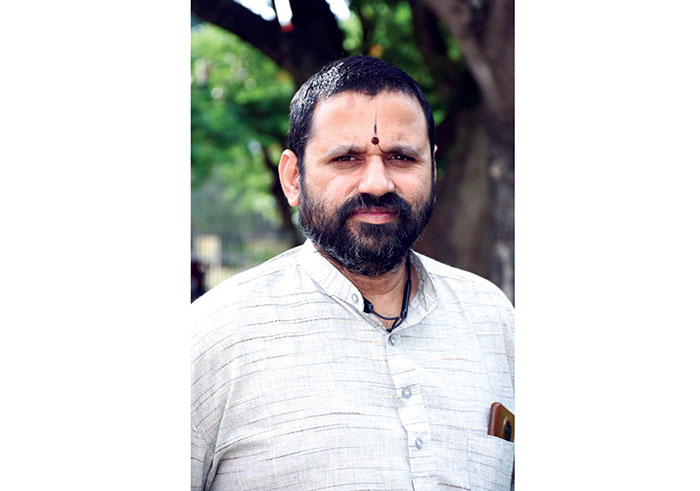
Research on rare Jagannatha Vijaya and Tatva Chintamani manuscripts
The conservation and digitisation process are progressing speedily and we are aiming to complete the project by the end of December this year. We have entered into an understanding with New Delhi-based Rashtriya Sanskrit Sansthan (Central Sanskrit University) to undertake research under ‘Ashtadashi’ project on the rare Jagannatha Vijaya and Tatva Chintamani manuscripts propagating ‘Nyaya Shastra.’ Rs. 34 lakh has been released for this project and Sanskrit scholar H.V. Nagaraja Rao is conducting the research.
The Indian Knowledge System, an innovative cell under the Ministry of Education, has initiated a project to collect scientific manuscripts and is offering a grant of Rs. 15 lakh. We are in talks with the institute on the modalities. – Dr. D.P. Madhusudhan Acharya, Director, Oriental Research Institute, Mysuru



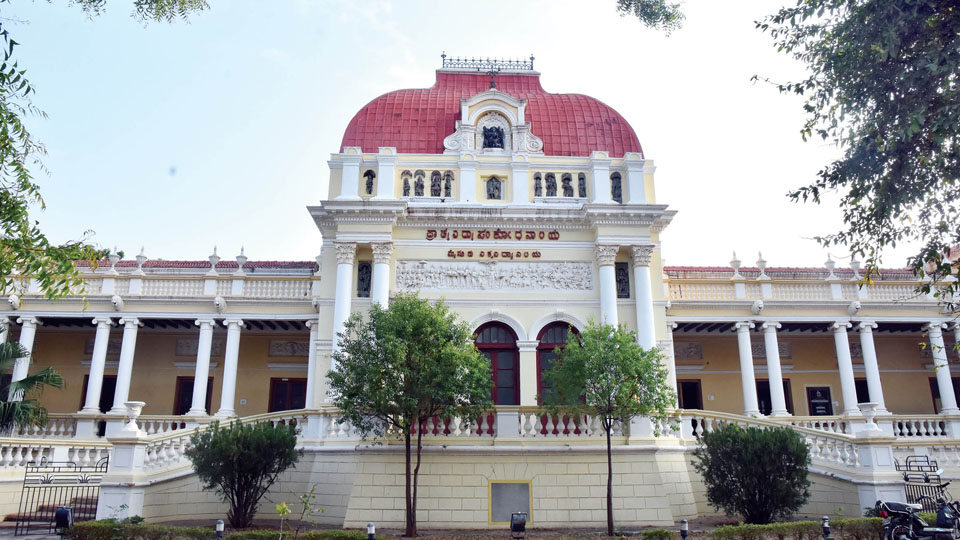




Recent Comments